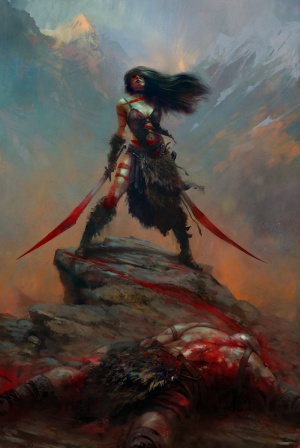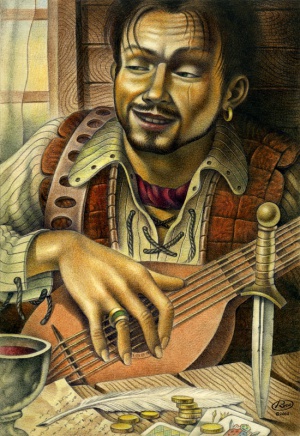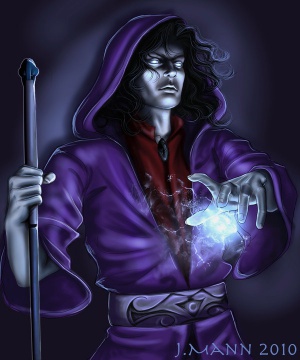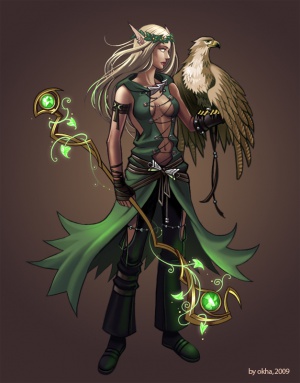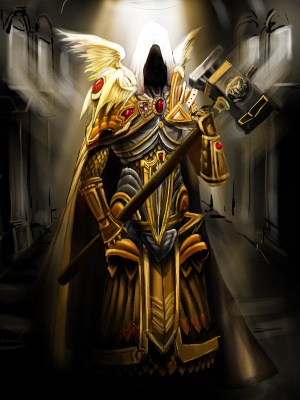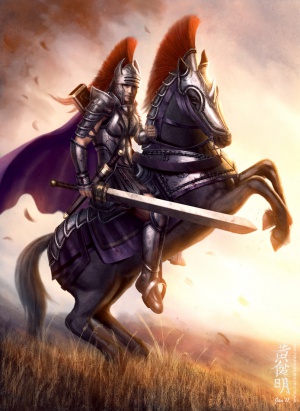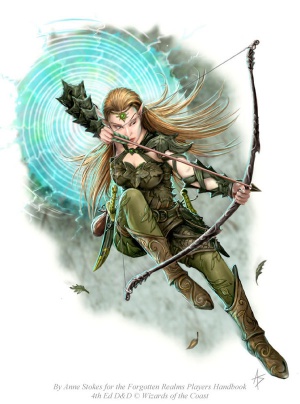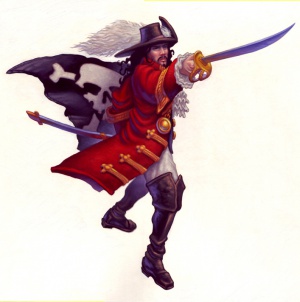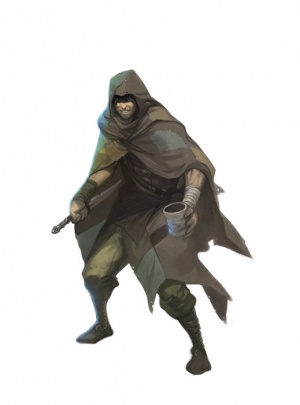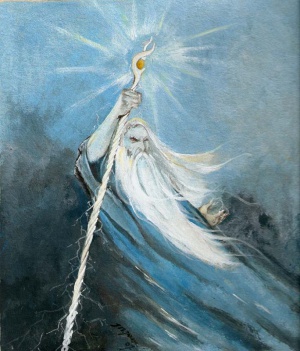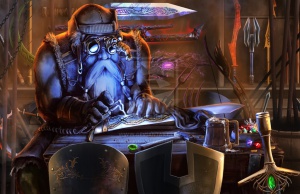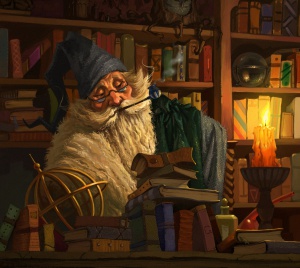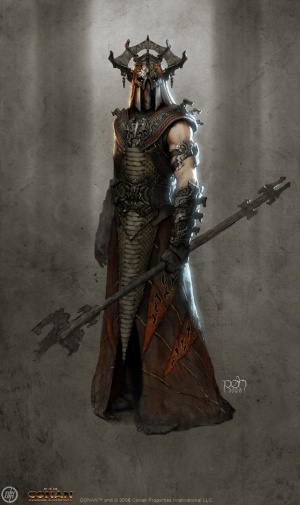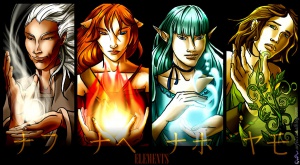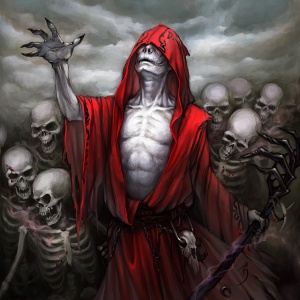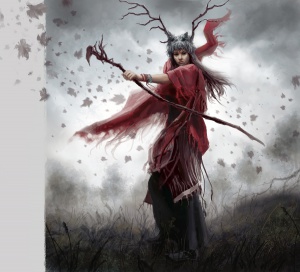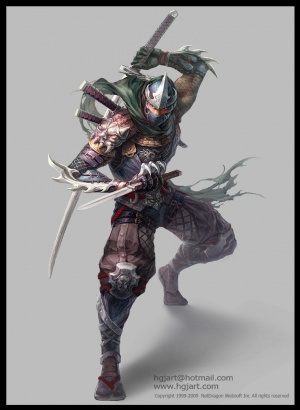Blut & Schätze Templates
Anders als bei einem "normalen" GURPS Spiel, müssen bei unserer Dungeon Fantasy Implementation Blut & Schätze Charaktere nach Templates erschaffen werden. Hier finde Ihr eine Übersicht über alle wählbaren Templates. Die verschiedenen wählbaren Rassen sind in DF3 aufgelistet, in den Regeln findet Ihr Hilfen wie man den Charakter richtig erstellt im GCA (GURPS Character Assistant).
Barbarian[Bearbeiten | Quelltext bearbeiten]
Das Template für den Barbarian findet Ihr in DF1:4.
Beschreibung[Bearbeiten | Quelltext bearbeiten]
You’re a beefy warrior from somewhere distant and a little backward – probably the Frozen North. You combine physical grit with a connection to nature second only to that of the druid (DF1:7). As the Big, Tough Guy, you can withstand almost any punishment, even dangers that armor can’t stop, making you as essential in combat as the party’s knight (DF1:8). You’re also a more-than-capable outdoorsman, and as crucial as the scout (DF1:10) on outdoor adventures.
Tipps zur Charaktererstellung[Bearbeiten | Quelltext bearbeiten]
Many barbarian archetypes exist. The savage berserker has more ST, extra “physical grit” like HT and Hard to Kill, and such disadvantages as Berserk and Bloodlust. The primal survivalist goes for more Per, Discriminatory Smell, Temperature Tolerance, and disadvantages like illiteracy, Low TL, and reduced Wealth. The noble wilderness guardian prefers Animal Empathy, Animal Friend, Fearlessness, and disadvantages like Overconfidence and Sense of Duty.
Choose weapon skills that underline the desired “feel.” The stereotypical Dark Ages warrior might have Axe/Mace, Shield, and Thrown Weapon (Axe/Mace). A caveman would probably prefer Spear and Thrown Weapon (Spear).
Match Survival specialty and background skills to origin, too. An ocean raider from the Frozen North will want Survival (Arctic), Seamanship, and Skiing. A jungle guerrilla in leopard will find Survival (Jungle), Gesture, and Observation more useful.
Since any weapon is deadly at ST 17, you don’t need a pricy sword; axes, sticks, and clubs will do. Unlike other warriors, then, consider using the 5 points that quirks give you to your archetype instead of sacrificing them for money. For example, a jungle warrior might buy two more levels of Camouflage and another level of Stealth – strong and sneaky is a deadly mix!
Bard[Bearbeiten | Quelltext bearbeiten]
Das Template für den Bard findet Ihr in DF1:5.
Beschreibung[Bearbeiten | Quelltext bearbeiten]
You’re a magical minstrel who dabbles in a little of everything: the roguish pursuits of the thief (DF1:12), the swordplay of the swashbuckler (DF1:11), and the spellcraft of the wizard (DF1:13). You rarely need to be so crudely direct, though – the power of Bard-Song (DF1:21) lets you neutralize many opponents without resorting to violence or tiring spells. Exceptional social gifts round out your repertoire, helping the party score superior deals when buying or selling in town.
Tipps zur Charaktererstellung[Bearbeiten | Quelltext bearbeiten]
A bard doesn’t start out an expert at anything, and can be challenging to play until he has earned some points to spend on his favorite tricks. Thus, bards are best for players who don’t mind supporting the party with a little song, a little spellcasting, and a little swordplay. It helps to decide early on whether to focus on Bard-Song (Rapier Wit and Terror work in combat), spells (also combat-effective, and benefit from higher IQ or Bardic Talent), or out-of-combat effectiveness (e.g., high Charisma aids reactions, and enables the Enthrallment skills to sway platoons of neutrals to the bard’s cause; see B191). Since a bard needs a costly blade and a musical instrument – the latter often bought as an expensive power item (DF1:28) – it’s wise to sacrifice some of the 5 points from quirks for cash. Given the diversity of Bard-Song abilities, instruments, and spells, bards don’t especially need those points to further distinguish themselves from their peers.
Cleric[Bearbeiten | Quelltext bearbeiten]
Das Template für den Cleric findet Ihr in DF1:6. Im Zusatzband DF7: Clerics findet Ihr weitere Arten von Klerikern, hier ist der aus Band 1 beschrieben.
Beschreibung[Bearbeiten | Quelltext bearbeiten]
You’re the mortal representative of the Powers of Good. You might not be the physical foe of Evil that is the holy warrior (DF1:7), but you’re no cloistered idealist – when Evil need whacking, you go out in the world and whack it. To complement your mundane weapons, your god grants you healing and protection spells (DF1:19), and also the spark of Holy Might (DF1:22), which never fails you even when you’re too exhausted to fight or cast.
Tipps zur Charaktererstellung[Bearbeiten | Quelltext bearbeiten]
The classic fantasy cleric who wants to turn undead should spend 24 of the 25 points earmarked for Holy abilities on True Faith with the Turning enhancement (P84). Other possibilities exist, but most work better as high-level abilities, to be acquired later with earned points. After that, the most important thing to decide for a cleric is starting spells. Common areas of concentration include spells that boost resistance and combat effectiveness, known as "buffs”; healing spells; and spells for combating supernatural foes (evil wizards, undead, etc.). For example:
- Buffs: Affect Spirits, Armor, Bravery, Coolness, Flaming Weapon, Magic Resistance, Might, Resist Acid, Resist Cold, Resist Disease, Resist Fire, Resist Lightning, Resist Pain, Poison, Resist Pressure, Shield, Strengthen Will, Vigor, Warmth, and Wisdom.
- Healing: Awaken, Cleansing, Great Healing, Healing Slumber, Lend Energy, Lend Vitality, Major Healing, Minor Healing, Neutralize Poison, Recover Energy, Relieve Paralysis, Restoration, Restore Hearing, Restore Sight, Restore Speech, Share Vitality, Stone to Flesh, Stop Bleeding, Stop Paralysis and Stop Spasm.
- Supernatural Warfare: Affect Spirits, Astral Vision, Aura, Command, Command Spirit, Detect Magic, Dispel Possession, Final Rest, Magic Resistance, Repel Spirits, Sense Spirit, Silence, Strengthen Will, Summon Spirit, Sunbolt, Sunlight, Thunderclap, Turn Spirit, Turn Zombie, and Watchdog.
These choices might have something to do with the cleric’s god, but other traits can reflect the deity’s nature. For instance, a priest of the War God might select more DX; disadvantages like Fanaticism, Intolerance, and Overconfidence; and “soldierly” skills such as Climbing, Hiking, and Stealth. Most clerics will want to trade some or all of the 5 points from quirks for money for a good power item (DF1:28) – most often a superior holy symbol – and decent armor.
Druid[Bearbeiten | Quelltext bearbeiten]
Das Template für den Druid findet Ihr in DF1:7.
Beschreibung[Bearbeiten | Quelltext bearbeiten]
Your friends call you a “nature priest.” That’s half true: you do worship Nature, and Nature has powerful allies, but you’re dedicated to Life above all, and your powers are a divine reward for your fervor. Like the cleric (DF1:6), you cast supportive spells (DF1:19). You’re also an initiate of the Druidic Arts (DF1:22). These gifts don’t work perfectly down in the dungeon, but they do work – and without you, the party often wouldn’t reach the dungeon!
Tipps zur Charaktererstellung[Bearbeiten | Quelltext bearbeiten]
Druids fall into a few broad categories, defined largely by their spells. Beastmasters prefer spells that let them summon and interact with animals, and might enter play knowing Animal Control (Bird Control, Fish Control, Mammal Control, Reptile Control, and Vermin Control), Beast Link, Beast-Rouser, Beast Seeker, Beast Speech, Beast-Soother, Beast Summoning, Master, Protect Animal, Repel Animal (Repel Birds, Repel Fish, Repel Mammals, Repel Reptiles, and Repel Vermin), Rider, and Rider Within.
- Elementalists favor spells of elemental fury. A typical starting list would be Clouds, Fog, Freeze, Frost, Mystic Mist, Rain, Recover Energy, Shape Air, Shape Earth, Shape Water, Snow, Summon Air Elemental, Summon Earth Elemental, Summon Fire Elemental, Summon Water Elemental, Wall of Wind, Waves, Whirlpool, Wind, and Windstorm.
- Green druids focus on Plant spells and magic useful in the forest. Such a druid might start with Animate Plant, Blossom, Conceal, Create Plant, False Tracks, Forest Warning, Hide Path, Identify Plant, Plant Control, Plant Growth, Plant Sense, Plant Speech, Plant Vision, Pollen Cloud, Rain of Nuts, Rejuvenate Plant, Shape Plant, Tangle Growth, Walk Through Plants, and Walk Through Wood.
Of course, a druid could know just about any set of druidic spells – he isn’t limited to one of these lists. Druids who desire access to powerful combat and shapeshifting magic should be sure to raise Power Investiture (Druidic) to level 4 or 5 with advantage points. Unlike other casters, druids rarely trade the 5 points they get from quirks for money for a power item. More likely investments are extra spells or Druidic abilities.
Holy Warrior[Bearbeiten | Quelltext bearbeiten]
Das Template für den Holy Warrior findet Ihr in DF1:7.
Beschreibung[Bearbeiten | Quelltext bearbeiten]
You fight for what’s right – and the gods have your back. You’re on a quest to bury Evil six feet deep and make sure it stays there. Like the cleric (DF1:6), you carry the flame of Holy Might (DF1:22), but where the cleric wields spells, you prefer the sword, much like the knight (DF1:8). While people who don’t know you sometimes think that makes you a generalist, you’re a true specialist when it comes to destroying Evil.
Tipps zur Charaktererstellung[Bearbeiten | Quelltext bearbeiten]
The whole point of playing a holy warrior is to have Holy abilities, so it makes sense to favor these when choosing advantages. Holy warriors get especially good use out of Blessed (notably the Heroic Feats variant; see B41), Resistant to Evil Supernatural Powers, and True Faith with Turning (P84). Gamers who wish to focus exclusively on fighting will be happier playing barbarians, knights, and swashbucklers. Other choices should support a clear archetype. Some holy warriors are paragons of religious chivalry (peaceful Higher Purpose, more Holiness, Charitable, Code of Honor, and of course the Lance and Riding skills); others are hard-eyed inquisitors (more Will, Unfazeable, Honesty, Intolerance, No Sense of Humor, and skills like Stealth and Interrogation). All are crusaders, whether they lead armies (additional Born War Leader, Fanaticism, Sense of Duty, and soldier’s skills such as First Aid and Hiking) or confront Evil’s champions in personal combat (more ST and HP, High Pain Threshold, Bloodlust, and supplementary Physiology and Psychology specialties for monsters). Like most fighters, holy warriors should consider sacrificing some of the 5 points from quirks for cash enough to buy good weapons and armor.
Knight[Bearbeiten | Quelltext bearbeiten]
Das Template für den Knight findet Ihr in DF1:8.
Beschreibung[Bearbeiten | Quelltext bearbeiten]
Officially, you might not be a knight, but you’re more dedicated than some fop living in a castle. Anyway, “knight” sounds better than “fighter” (dull!) or “thug” (offensive!). Like the barbarian (DF1:4), you favor heavy weapons, and like the swashbuckler (DF1:11), you’re very skilled. Unlike both, though, you have the good sense to wear proper armor. You’re into dungeon delving to prove your mettle – although the loot doesn’t hurt, given the high price of decent weapons and armor.
Tipps zur Charaktererstellung[Bearbeiten | Quelltext bearbeiten]
With 60 points in advantages, any “heavy fighter” archetype fits. Examples include the chivalrous knight (more Born War Leader, Weapon Master with knightly weapons, Code of Honor (Chivalry), Honesty, Sense of Duty, and the Broadsword, Heraldry, Lance, Riding, and Savoir-Faire skills), the lithe Amazon (high DX and Basic Speed, Sense of Duty to her sisters, skill with Shortsword and Spear, and a soldier’s knowledge of First Aid, Hiking, and Scrounging), the thug (piles of ST, Bad Temper, Bloodlust, the Flail skill because it’s menacing, and Forced Entry and Intimidation), and the crusty mercenary (extra HT and HP, Hard to Kill, Rapid Healing, Code of Honor (Soldier’s), Greed, the Polearm skill for the battlefield, and Carousing and Gambling for downtime). An important decision is whether to master just one weapon skill or be good with two or three. A single skill will let you dominate combat with your weapon of choice right from the start. You can’t control what loot you’ll find, though – if you’re adept at Axe/Mace, Broadsword, and Flail, then you’ll be able to use most one-handed weapons that turn up. Don’t forget that some weapons need multiple skills; e.g., a samurai needs Broadsword and Two-Handed Sword for his katana (but can omit Shield). Most knights trade the 5 points from quirks for cash for arms and armor.
Martial Artist[Bearbeiten | Quelltext bearbeiten]
Das Template für den Martial Artist findet Ihr in DF9:4.
Beschreibung[Bearbeiten | Quelltext bearbeiten]
You’re a true master of barehanded combat and exotic weapons, from a faraway land – probably the Mysterious East. While the knight (DF1:8) and swashbuckler (DF1:11) claim to be trained in “martial arts,” their kung fu is weak. Years as a monastic ascetic have awakened your gift for Chi Mastery (DF1:21) and taught you disciplines that channel your inner strength. Now you’ve left the monastery for the dungeon to perfect your art against even the strangest of foes.
Tipps zur Charaktererstellung[Bearbeiten | Quelltext bearbeiten]
The martial artist must balance Chi abilities, other advantages, and special skills. It’s tempting to take a few combateffective Chi abilities (DR, Striking ST, etc.) and put all leftover points into one skill (e.g., Power Blow). However, the warrior with Catfall, DR, Danger Sense, and Resistant will probably live longer to develop his skills! Favored combat skills affect these choices. Some martial artists fight using Judo and Karate. They need DR (to protect their hands) and Striking ST (because they lack a weapon’s leverage), and should improve Breaking Blow early in order to defeat armor. Martial artists who fight armed can take a longer view – they have a weapon between them and their enemies. This template depicts a fighter fresh from the monastery or academy. He’s capable but needs time to hone his skills. He’ll grow quickly with a few points, and the 5 points from quirks can boost key skills significantly. Those points aren’t needed for cash – a martial artist requires only inexpensive weapons and perhaps gauntlets (count as brass knuckles and protect the hands).
Scout[Bearbeiten | Quelltext bearbeiten]
Das Template für den Scout findet Ihr in DF10:4.
Beschreibung[Bearbeiten | Quelltext bearbeiten]
You’re called “archer,” “stalker,” and “tracker,” and you’ve filled all three roles in the past. Such labels don’t do justice to your expertise, however. By taking the stealth of the thief (DF1:12) into the great outdoors and mixing it with the mobility and skill at arms of the swashbuckler (DF1:11), you’ve become a master of guerrilla warfare. You track elusive prey of all descriptions – and when the trail leads down into the dungeon, you follow it without hesitation.
Tipps zur Charaktererstellung[Bearbeiten | Quelltext bearbeiten]
The scout has one of the more specialized templates. It’s built around the Bow and Tracking skills, plus supporting abilities. Thus, a scout requires interesting choices of advantages, disadvantages, and skills to stand out. Classic archetypes include:
- Bounty Hunter: You capture criminals – dead or alive – supplementing archery with traps and beatings. Danger Sense helps you avoid attempts to turn the tables on you, and high Per doesn’t hurt, either. Especially suitable disadvantages include Callous, Code of Honor (Pirate’s), Greed, Loner, No Sense of Humor, and Paranoia. A one-handed Melee Weapon skill and Shield are handy; not every hunt ends with a bowshot. Use background skill points to raise Stealth and Traps, and to buy Brawling, Knot-Tying, and Wrestling for subduing and restraining your quarry.
- Ranger: You’re an honor-bound protector of roads and wild places – part patrolman, part warden. Combat Reflexes is classic (nobody surprises a ranger), and the remaining points might raise Basic Move for covering ground quickly, or buy Absolute Direction. Disadvantages include several of Code of Honor, Honesty, Sense of Duty, and various Vows, plus Loner, Phobia, and/or Social Stigma to explain why you avoid others. Get sword and Shield skills, and spend background skill points to raise Navigation a couple of levels and buy Boating, Riding, Running, Skiing, and Swimming, all so that you can get anywhere at any time.
- Sharpshooter: You’re a dedicated bow sniper – basically, an assassin. You’ll almost certainly want Weapon Master (Bow) for the damage bonus. Disadvantages ought to include a heavy dose of “negative” traits like Bloodlust, Callous, Intolerance, and No Sense of Humor. Since you use your bow whenever possible, you’ll probably want only a sword skill for backup (no Shield). Background skill points might raise Bow another level, buy other assassination skills such as Garrote and Knife, and add Fast-Draw for your blades.
Swashbuckler[Bearbeiten | Quelltext bearbeiten]
Das Template für den Swashbuckler findet Ihr in DF11:4.
Beschreibung[Bearbeiten | Quelltext bearbeiten]
You’re living proof that the sword is mightier, speedier, and more stylish than, well, just about everything. In the time it takes the plodding knight (DF1:8) to strike his first blow, you’ve struck two, and with more flair – and although you respect the precision of the martial artist (DF1:9), you would never bring fists to a swordfight. You like nothing better than to leap and tumble through battle, blade a blur, deftly covering the party’s flanks and rear.
Tipps zur Charaktererstellung[Bearbeiten | Quelltext bearbeiten]
The swashbuckler is built around one sword skill. Be sure that Enhanced Parry and Weapon Master agree with that choice, that Weapon Bond is with a suitable blade, and that any sword acquired as Signature Gear is similarly appropriate. If selecting the Vow pertaining to weapons, it should match all of this as well. Obviously, this makes the swashbuckler a real weapon specialist – a lot like the scout. The difference is that the swashbuckler has great latitude with advantages. It’s possible to create completely different characters by focusing on offense (more ST, Extra Attack, Striking ST, and Signature Gear for fine swords), defense (more Basic Speed, Enhanced Dodge, and Enhanced Parry, not to mention extra Luck), or dash and flair (Appearance, Charisma, Daredevil, Rapier Wit, and Serendipity). An interesting choice of background skills is equally important. Some swashbucklers are fops with Savoir-Faire and every known Connoisseur specialty. Others are rakes or pirates with Climbing, Fast-Talk, Gambling, Streetwise, and possibly Seamanship – and of course Search for looting dead bodies! Most swashbucklers would benefit from sacrificing the 5 points they get from quirks to acquire the money for a nice sword. Those with Signature Gear won’t need this, though, and may prefer to buy higher weapon skills or a few skills borrowed from the thief.
Thief[Bearbeiten | Quelltext bearbeiten]
Das Template für den Thief findet Ihr in DF1:12.
Beschreibung[Bearbeiten | Quelltext bearbeiten]
You’re a “procurement expert,” whatever unflattering terms others may use. You take things that need taking. Of course, the best stuff is inevitably in trapped chests behind locked doors guarded by monsters in mazes. This frames your business relationship with the party: they merely have to take care of the monsters. You’ll handle finding treasures and unlocking doors and bypassing traps – for a reasonable consideration, naturally. Oh, and those rumors that you moonlight as an assassin or a spy? Nonsense!
Tipps zur Charaktererstellung[Bearbeiten | Quelltext bearbeiten]
Thieves aren’t combatants built around toughness and combat skills, nor do they have access to powers, spells, and special skills. They’re broad-based experts at mundane skills. Thus, they’re best-suited to players who prefer a supporting role in pre-combat scouting and post-combat looting. A party won’t live long without one thief, and may consist entirely of thieves.
- The burglar specializes in getting in and stealing things. He might choose Catfall, Double-Jointed, and more High Manual Dexterity. He often suffers from Kleptomania and is Curious, and frequently has traits like Overconfidence and Skinny. His background skill points go into improved Climbing, Forced Entry, and/or Lockpicking, leaving a point or two for something like Observation (for casing targets).
- The mastermind is a plotter. He has more IQ – plus Wealth to bankroll his schemes. He’s classically a Trickster with a perverse Code of Honor about splitting up loot, and often Compulsive Lying. His background points go toward “urban” skills: higher Streetwise and Urban Survival, and things like Counterfeiting, Forgery, and Merchant.
- The assassin uses his skills not to steal but to kill for hire. Combat Reflexes, Gizmos (for concealed weapons), and Striking ST (for backstabs) all help. Bloodlust, Callous, Greed, and Loner are common. Background skill points go toward raising combat skills and buying Fast-Draw, Garrote, and Poisons. Many thieves put the 5 points from quirks into more skills. You can’t be “too good” at sneaking or finding traps!
Wizard[Bearbeiten | Quelltext bearbeiten]
Das Template für den Bard findet Ihr in DF1:4.
Beschreibung[Bearbeiten | Quelltext bearbeiten]
You’re the only truly learned delver. Your knowledge of magic is deeper than that of the cleric (DF1:6) or druid (DF1:7), and your spells don’t merely borrow the power of mercurial supernatural beings (demons are quite controllable). The party needs your mighty wizardry, knowledge of all manner of strange creatures, and raw intellect. Not that you don’t need the party – the greatest magical secrets are buried in the darkest pits, and you’re smart enough to travel with bodyguards.
Tipps zur Charaktererstellung[Bearbeiten | Quelltext bearbeiten]
Unlike other casters, wizards lack a power that’s distinct from their spells; their spell lists tend to define them. Essentially unrestricted access to magic makes generalization impossible, but here are three classics:
- Artillery Mage: Specializes in direct-damage magic – especially area-effect spells. A representative spell list is Breathe Fire, Burning Touch, Concussion, Create Air, Create Fire, Deflect Energy, Explosive Fireball, Extinguish Fire, Fire Cloud, Fireball, Fireproof, Flame Jet, Flaming Armor, Flaming Missiles, Flaming Weapon, Heat, Ignite Fire, Lightning, Purify Air, Rain of Fire, Resist Fire, Shape Air, Shape Fire, Smoke, Sound, Spark Storm, Stench, Thunderclap, Wall of Lightning, and Windstorm. Extra Magery to enable higher damage dice is valuable, and the Innate Attack skill is indispensable.
- Illusionist: Specializes in baffling (dumber) enemies. Typical starting spells would be Apportation, Blackout, Blur, Colors, Complex Illusion, Continual Light, Darkness, Daze, Fascinate, Flash, Foolishness, Haste, Hide, Hinder, Hush, Illusion Disguise, Illusion Shell, Independence, Invisibility, Light, Mage-Stealth, Mass Daze, Mirror, Perfect Illusion, Phantom, Silence, Simple Illusion, Sound, Voices, and Wall of Silence. A Photographic Memory for faces and voices greatly enhances believable illusions, and mundane Stealth and many of these spells are complementary.
- Necromancer: Specializes in creating undead and throwing malisons. A necromancer might start with Agonize, Animation, Choke, Clumsiness, Control Zombie, Death Vision, Deathtouch, Debility, Decay, Frailty, Itch, Lend Energy, Lend Vitality, Minor Healing, Pain, Paralyze Limb, Pestilence, Rotting Death, Sensitize, Sickness, Skull-Spirit, Spasm, Steal Energy, Steal Vitality, Stun, Summon Spirit, Test Food, Wither Limb, Zombie, and Zombie Summoning. Spirit Empathy is handy, obviously – as are Hidden Lore specialties pertinent to darker beings.
Most wizards want as many FP as they can afford. It’s also useful to trade the 5 points granted by quirks to get money for a high-capacity power item (DF1:28) and a belt stocked with paut (DF1:29).
Artificer[Bearbeiten | Quelltext bearbeiten]
Das Template für den Artificer findet Ihr in DF4:5.
Beschreibung[Bearbeiten | Quelltext bearbeiten]
The artificer deals in gadgetry for a living. He is to technology what the wizard is to thaumatology. Some people apply the term “artificer” to architects, masons, smiths, and similar craftsmen, but the true artificer is a master of hasty invention and field-expedient improvisation. Every delver loves wonderful toys – and you are the one who makes them! You’re the go-to guy for potions, armor adjustments, and finicky traps that even the thief is reluctant to touch. But unlike alchemists and armorers in town, you’re not happy to stay parked in a shop. Your goal is to perfect your art, and there’s no better academy than the trick- and trap-filled hell-holes commissioned by dying kings and mad wizards.
Tipps zur Charaktererstellung[Bearbeiten | Quelltext bearbeiten]
Artificers are distinguished more by their actions in the field – their Gizmos and jury-rigs – than by their abilities. Still, there are two familiar, almost diametrically opposed stereotypes. Most artificers fall somewhere in between.
- The engineer is practical, and relies on a good stock of supplies, a well-loved set of tools, and his skills. He tends to have more IQ, and nearly always sufficient Wealth that he can acquire a wide selection of items to reveal as Gizmos. However, he doesn’t rely on Gizmos. He lugs a lot of gear (making Lifting ST valuable), much of which is likely to be carefully selected, justifying Equipment Bond with tools and Signature Gear in the form of exceptional arms and armor (his designs!). He favors weapons that double as tools, wielding a hatchet with Axe/Mace or a machete with Shortsword. His background skills tend to be crafts – Architecture, Jeweler, Smith, Leatherworking, etc. – along with Merchant to help him fund his work.
- The mad inventor, by contrast, prefers to travel light, and finds merchants and bank accounts tiresome. He meets each challenge with genius, guts, good fortune . . . and Gizmos, often 5, 10, or more. Lady Luck is his ally, and he’s as likely to invest in Luck and Serendipity as in Gizmos. If forced to fight, he uses weapons suited to a civilized genius, wielded with Rapier, Saber, or Smallsword, and often enhanced with Weapon Bond. Background skills inevitably include Hazardous Materials for handling things that sane inventors avoid. Counterfeiting, Holdout, Search, and Stealth are valuable when money runs short.
Artificers are served well by trading some points from quirks for equipment – even if they’re Wealthy and have Signature Gear. An artificer’s hardware defines him! The more paraphernalia he has, the wider his options for Gizmos. Keep detailed lists of what he’s carrying and what’s in limbo, waiting to show up as Gizmos.
Scholar[Bearbeiten | Quelltext bearbeiten]
Das Template für den Scholar findet Ihr auf DF4:8.
Beschreibung[Bearbeiten | Quelltext bearbeiten]
You consider the wizard’s claim to be “the only truly learned delver” a conceit, if not a lie. Wizards know magic – but also distraction, in the form of superstition, easy power, and demons. Knowledge is your reward, and you don’t stop at the magical. You seek to solve all mysteries, from beasts’ names for themselves to the secrets of lost civilizations, and you’re not above learning practical skills in order to plumb dungeons for forgotten truths.
Tipps zur Charaktererstellung[Bearbeiten | Quelltext bearbeiten]
Scholars must balance Book-Learned Wisdom with Wild Talent. “Substitute casters” will favor the latter, but the former allows unrivaled pre-adventure prep – especially with some quirk points converted to cash for books! Remaining choices define three major archetypes.
- The curator researches the locations and safeguards of lost civilizations’ strongholds, and then relieves them of artifacts “for safekeeping.” This is dangerous work – consider higher ST, DX, or HT, or Luck. Valuable Hidden Lore specialties are Lost Civilizations, Magic Items, and Magical Writings. Secondary skills customarily include Architecture, Prospecting, and Traps. Lasso and Whip do double duty as combat skills and means of grabbing trapped items. Connoisseur pays off for identifying finds.
- The professor genuinely seeks knowledge. Better IQ and a few Languages are fitting. Hidden Lore still runs toward Lost Civilizations, Magic Items, and Magical Writings, but other skills reflect key academic interests – e.g., magical theory (Alchemy, Occultism, and Thaumatology), medicine (Diagnosis, Pharmacy, and Surgery), and arcane beliefs (Occultism, Philosophy, and Theology). Saber is traditional for academic dueling. Background skills like Connoisseur, Riding, and Savoir-Faire suit a privileged thinker.
- The wise man is often a hamlet’s stand-in for a true caster. Extra Wild Talent is useful for recalling Stone to Flesh when the cleric is petrified or Remove Curse when the wizard succumbs to Suspend Magery. This often accompanies knowledge of the supernatural; typical Hidden Lore specialties are Demons, Elementals, and Spirits. Plant, animal, and healing skills (e.g., Naturalist, Pharmacy, and Veterinary) also fit, while youthful experience justifies Staff, Climbing, and Hiking.
Demonologist[Bearbeiten | Quelltext bearbeiten]
Das Template für den Demonologist findet Ihr in DF9:6.
Beschreibung[Bearbeiten | Quelltext bearbeiten]
For whatever reason, you’re interested in the deep, dark powers of the universe. Whether your motive is dangerous curiosity, an obsessive desire to defend the world against the most fearsome monsters of all, an arrogant belief that you can use these tools without being corrupted, or something more sinister, you’re prepared to take risks that most people would consider insane. While other adventurers plunge into dungeons in search of shiny baubles or to prove themselves against lesser monsters, you’re interested in the more exotic sorts of magical loot and snippets of ancient lore that might be found there. (Of course, you sometimes need mundane resources yourself, or have secondary goals to pursue.) No one knows about plunging into darkness and facing down monsters better than you do. Oh, you can understand the more general interests of the wizard, and you know that all those wizardly spells work well enough in their way – but wizards think that they can handle demons, without understanding the depth of special insight that you bring to the business. You get on less well with clerics and shamans, though; they suspect you of selling out to dark powers or worshiping beings who they don’t like. (Clerics of evil gods think that you’re poaching on their territory without paying their deities sufficient respect.) If you can convince them otherwise, they may consult you when they find that exorcisms are getting beyond them – and you have nothing against the gods, so you can be polite back to them – but it’d be nice if they were prepared to take a more analytical approach.
Tipps zur Charaktererstellung[Bearbeiten | Quelltext bearbeiten]
The big question here is what makes someone take up the dangerous occupation of working with demons.
- The wild-eyed scholar is obsessed with knowledge, and doesn’t always pay enough attention to the cost. He regards practical demonological magic as an interesting proof of concept. Take disadvantages such as Curious and Clueless, and focus on skills such as Research, Speed-Reading, Cartography, and Hidden Lore.
- The methodical evil-slayer understands about the dangers of demonology perfectly well. Moreover, he’s ready to run calculated risks in order to get inside evil’s guard, understand demons’ weaknesses, and destroy them efficiently – because he really wants them gone. This almost certainly means an Obsession (or maybe Paranoia), and often Bloodlust, with Higher Purpose perhaps as the beneficial part of the deal. Surviving the lifestyle may demand advantages such as Combat Reflexes, High Pain Threshold, and Slayer Training, as well as skills such as Exorcism and Crossbow.
- The walking freakshow, by contrast, may not even have chosen the career voluntarily. Being stuck with problems such as Weirdness Magnet and Frightens Animals, as well as gifts such as Channeling or Medium, he’s learned what he needs to survive – starting with skills such as Research, Fast-Talk, and Diplomacy.
- Of course, not all adventuring demonologists are well-meaning or innocent. The starter megalomaniac is an example of more dubious motivations, prodding and poking at the edges of dark power and dreaming of the day when he can play with the big boys. If he’s not actually corrupted yet, he’s scarily unworried by the possibility; he figures that enough power means never having to say that you’re sorry. Megalomania defines this type, obviously, and may be compounded by things like Callous or Odious Personal Habits. He may add dangerously overt Demonological abilities (including sinister Allies, if possible) and at least dream of acquiring Social Regard (Feared), meanwhile employing Intimidation a lot in human society.
Elementalist[Bearbeiten | Quelltext bearbeiten]
Das Template für den Bard findet Ihr in DF9:9.
Beschreibung[Bearbeiten | Quelltext bearbeiten]
At first glance, elementalists might seem like a subclass of the standard wizard, with a strong focus on rather blunt elemental magic. However, they’re a bit subtler than that. They don’t just happen to like casting elemental spells; they have a deep, almost spiritual interest in the lore of the elements, and are notably good at working with elemental spirits. They often summon such creatures to do their bidding, and sometimes link themselves to “elemental familiars,” acquiring nonspell powers of their own in the process. Because of this tight focus, an elementalist has access to a smaller range of spells than a wizard does. Elementalists may lean toward good or evil, but some of them come to worship Nature and get on well with druids; the elements are the fundamental building blocks of Nature, after all. Others, though, see the elements as things to be dominated and used as a source of power, rather than respected or worshiped – which annoys druids. You’re an expert in the magical power of the elements, and because you’ve studied them so deeply, you’re keenly aware of their spiritual aspect. You know that the universe is composed of the elements in various proportions – and that powerful spirits govern and control the operation of those elements. This makes you both powerful and insightful. (Oh, ordinary wizards can cast a few more spells than you can, but that’s at the cost of not really understanding the most important things.) All this means that you’re invaluable in the dungeon, well equipped to handle both physical problems and confrontations with the most important spirits. You join expeditions to seek out arcane elemental lore and interesting materials, and to make new contacts in the elemental realms; having a few friends with other interests around can help along the way, you must admit.
Tipps zur Charaktererstellung[Bearbeiten | Quelltext bearbeiten]
The first question with any elementalist is whether he’s a specialist, focusing on one specific element, or a generalist, working with all of them equally adeptly. This is determined by which type of Elemental Influence the player chooses; see DF9:10. Specialists are often narrowly focused and eccentric, with personalities to match their specialties. Blazing fire experts have Elemental Influence (Fire), Pyromania, Bad Temper, and spells and skills that give effective fire-based attacks. Stolid earth specialists exhibit Elemental Influence (Earth) and Loner, No Sense of Humor, Oblivious, or Stubbornness, along with Prospecting skill. Breezy and light-hearted air workers possess Elemental Influence (Air), Impulsiveness, Overconfidence, several DX-based skills, and Weather Sense. Deep and ever-changing water mages have Elemental Influence (Water), Intuition, Wild Talent, Meditation, and an eccentric choice of spells. Generalists, meanwhile, can sometimes be dangerously obsessed with preserving balance, seeming especially mystical and prone to peculiar decisions (with Disciplines of Faith, Odious Personal Habits, Philosophy, and Theology). All that established, a few personality patterns can fit both specialists and generalists, although not all elementalists fit these stereotypes:
- The devotee of primal power more or less worships the elements, feeling a definite affinity to druids, although this is strictly a private sort of faith; take a Sense of Duty to friendly elementals, and probably Medium, Disciplines of Faith, and Theology.
- The elemental scholar is concerned with the academic theory of elemental lore, and is closer to a conventional wizard. Curious is more or less mandatory, plus an appropriate Obsession or “geeky” problems such as Clueless, with academic skills such as Thaumatology, Hidden Lore, and Philosophy also fitting.
- The master of power is in this profession for the raw force, for what it can do practically or just for fun. Megalomania or an Obsession fits the former motive, Impulsiveness or Pyromania fits the latter. The adventurer should have lots of damage-producing spells, plus the skills to use them and Intimidation.
Necromancer[Bearbeiten | Quelltext bearbeiten]
Das Template für den Necromancer findet Ihr in DF9:13.
Beschreibung[Bearbeiten | Quelltext bearbeiten]
You are an expert on the supernatural boundaries between life and death – and you know how to wield the power that comes with that expertise! Death and the undead are technical issues for you, and like any technical expert, you know how to fix problems in your area of expertise – one way or another. You may go adventuring in order to confront and destroy the undead, or to find out more about the deep crypts and strange wildernesses in which they so often dwell. Moreover, other adventurers often create more raw material for your studies. You respect clerics and demonologists; knowing about death means that you know something about the higher and lower realms, and you prefer to keep on the right side of the powers that rule there. Unfortunately, though, too many clerics suffer from misunderstandings about your work, so you sometimes have to tread carefully. You see wizards, elementalists, and shamans as fellow professionals – a bit unfocused, perhaps, but often powerful, and it can be useful to compare notes sometimes.
Tipps zur Charaktererstellung[Bearbeiten | Quelltext bearbeiten]
A number of types fit this template, along with quite a few oddballs and eccentrics who don’t fit any clear stereotype. If the necromancer’s specific career is one that other people regard as unclean or just a bit sordid, he may have Social Stigma (Second-Class Citizen); if it’s one that angers the very gods, he may be Excommunicated. However, how most of these jobs are viewed varies from place to place.
- The psychopomp provides a service akin to an undertaker or priest, or in another sense, to a wilderness guide: His job is to help the spirits of the dead find their way to wherever they should go next. Unfortunately, some dead spirits don’t want to follow the rules, and some wizards and such have dangerous ideas about meddling with the natural order, so the psychopomp sometimes has to get a bit forceful, and maybe work with other defenders of the natural order. He has characteristics such as Higher Purpose, Medium, Licensed Exorcist, possibly Spirit Badge, a Sense of Duty, Exorcism, and Theology.
- Similarly, the exorcist focuses on the need to persuade some (usually incorporeal) undead and even other spirits to move on and stop causing trouble for the living. Because not all such spirits want to be persuaded, the exorcist has to be a sort of metaphysical warrior. He definitely needs Licensed Exorcist and Exorcism; Unfazeable will help at times, as will a selection of defensive spells.
- The monster slayer is interested in getting the dead who remain active in physical form to go on to the afterlife, perhaps motivated by an Obsession and shielded by Fearlessness and some low-key Necromantic abilities; he probably plans his work using Observation, then moves in with Slayer Training.
- The medium is mostly concerned with talking to the dead, perhaps initially out of curiosity. He doesn’t particularly want to make them depart if they aren’t causing trouble and want to stay around. This can lead to a deep knowledge of secret lore and provide some handy practical information for adventurers. Aside from having the Medium advantage, he may know multiple languages (Language Talent can help there), suffer from Phantom Voices (ghostly whispers from the ether at inconvenient moments), be Curious, and use Fast-Talk skill to keep the spirits’ attention.
- A related subtype, the death prophet, seeks information from “beyond the veil” even more actively, and has a taste for grand secrets of life and death. Oracle fits here, of course, and Curious or Paranoia may reflect the prophet’s core motives, while Disciplines of Faith may represent a necessary lifestyle, and Research skill may be required to interpret the data he acquires.
- Of course, some necromancers are in the game in pursuit of raw power, and don’t care about the feelings of the dead or the laws of men. The zombie master achieves this by raising armies of undead servants. Allies and the Mass Zombie spell are the methods, Megalomania defines the attitude, Oblivious reflects the lack of socialization, Social Stigma (Excommunicated) is probably an eventual inevitability, and Intimidation helps keep the living cowed.
• The death-bringer takes a scary joy in his acquaintance with death in many aspects, and is largely defined by his disadvantages. Aside from Callous and Low Empathy, he may have the sort of extreme style that leads to Disturbing Voice, Frightens Animals, Supernatural Features, or looking plain Ugly. He may also have a taste for spells that are appropriate for combat.
Note that these last two types may not fit well into adventuring parties with any sort of taste for conventional morality!
Shaman[Bearbeiten | Quelltext bearbeiten]
Das Template für den Shaman findet Ihr in DF9:16.
Beschreibung[Bearbeiten | Quelltext bearbeiten]
Shamans are sometimes seen as “primitive” magic-workers, perhaps even more so than druids – and it’s true that they often show up in barbarian societies, performing a role somewhere between a wizard and a cleric. Like wizards, they are technical specialists, whose specialty happens to be working with the supernatural – in their case, with spirits – and they are often prepared to work for whoever will pay. Unlike clerics, they don’t usually worship the beings with whom they deal – but they do have to remember that these are powerful free-willed entities, and treat them with respect, whereas wizards mostly just work with unthinking, neutral forces. Shamans know about gods, but usually try to avoid them; shamanism is about negotiation, and gods are too powerful to negotiate with comfortably. All this dealing with the spirit world as a matter of business make shamans seem rather strange to other humans; they often seem to be a bit crazy, especially if they’ve got into the habit of using strange mushrooms or potions to help them connect to the otherworldly realms. On the other hand, being so good at dealing with such things, they often have lots of minor spirits as Allies and Contacts. A shaman doesn’t generally use spells or powers to perform physical tasks, but calls upon his allied spirits to do whatever they are best at. Shamans do use their own magic to interact with spirits, and are often very at clearing up spirit-related problems. Unlike the other character types in this chapter, shamans have their own form of Power Investiture (DF9:18).
You’re an expert diplomat, negotiator, and problem-solver. The fact that most of your work in these fields happens to involve spirits rather than mortals maybe doesn’t seem important to you, and the fuss that other people make about the distinction may strike you as strange. Still, the fact that so few other people can handle this stuff means that you get a lot of profitable employment, so you don’t complain. Adventuring isn’t the point of shamanism; many shamans spend their time staying home and taking less dangerous work. Even so, a shaman sometimes has to consider risky trips into the spirits realm. You go adventuring to deal with threats involving spirits, to increase your knowledge of the weirder parts of the spirit world, or to turn a large (if risky) profit using your skills. Other adventurers are usually happy to have you around – you can deal with many problems that they’d find challenging, while you’re happy to have their more prosaic combat abilities guarding your back – and are happy to pay out your share of the loot. The aid of your personal spirit allies as scouts and advisers can be a big advantage for a party, too. However, you do sometimes have differences of opinion with clerics and druids (as well as demonologists and necromancers) over the correct attitude to take to certain parts of the spirit world.
Tipps zur Charaktererstellung[Bearbeiten | Quelltext bearbeiten]
A shaman has a narrow set of abilities, but he can choose to apply this in various ways.
- The freelance expert is an independent professional or a sort of mystic mercenary. He handles whatever problems come up that involve spirits and that someone is willing to pay to have fixed. He ought to have Code of Honor (Shamanic)..
- Conversely, the community leader has more of a sense of responsibility; he knows that it’s important for a human community to remain on good terms with the local spirits, and takes a leading role in society while acting as a mediator between the humans and spirit worlds. He’s more likely (though not certain) to have Clerical Investment, a Claim to Hospitality, and Social Regard, and maybe Charisma or Higher Purpose, along with a Sense of Duty to his people and skills such as Area Knowledge, Diplomacy, or Theology.
- The guardian of nature also has a feeling of responsibility (represented by a Sense of Duty) – but to the spirits and the things that they represent rather than to humans primarily. He can easily have Animal Friend, Loner, Low TL, some of the weirder power options, and lots of outdoors/wilderness skills.
• The urban shaman, accustomed to working in large, higher-tech human societies, is likely to be rarer. He’ll perhaps pursue Disciplines of Faith to maintain his mystic insights in this environment, have a Social Stigma and a willingness to use Intimidation to compensate, and maybe make a living in quiet times using Fortune-Telling. • The spirit-world explorer is motivated primarily by disadvantages such as Curious or maybe Obsession. He’ll use “technical” skills such as Cartography, Occultism, or Theology in his research, along with Observation and Search.
Ninja[Bearbeiten | Quelltext bearbeiten]
Das Template für den Ninja findet Ihr in DF12:4.
Beschreibung[Bearbeiten | Quelltext bearbeiten]
Masters of weapons and stealth, users of exotic gadgets and equally exotic powers – the ninja is the assassin of the underworld, literally and figuratively!
The ninja isn’t just some form of “dark martial artist” or “murderous thief,” though; he’s his own breed. If one must compare him to other delvers, he’s like a special blend of martial artist, swashbuckler, thief, and artificer (see Dungeon Fantasy 4: Sages). He defeats his enemies with a mix of special powers, combat skill, craftiness, and remarkable gadgets and covert-ops gear.
You are an expert at killing . . . and sometimes your targets lurk in the depths of a dungeon! Not for you are the one-weapon focus of the swashbuckler or the brute strength of the knight. You carry and use a vast array of special weaponry and devices to defeat your prey, and are also highly trained in barehanded fighting (although not as obsessively as the martial artist). You strike using a lethal combination of specialized attacks, exotic hardware, and stealth. You are even trained in the insidious secrets of the mind – not to sway emotions like the bard, but to trick, suggest, and deceive your enemies.
Tipps zur Charaktererstellung[Bearbeiten | Quelltext bearbeiten]
This template represents a ninja fresh out of the clan’s secret location. He possesses only a few Ninja Training abilities, if any, and his weapon skills are sharp but not especially deep or broad. Additional points in abilities is often the way to go – it is your Ninja Training abilities that will set you apart and give you the most bang for your buck.
- The master of death learns as many weapon skills as possible, and invests heavily in the Way of Death (DF12:7). Such a ninjamust balance his mastery of weapons (raising one skill) with his variety of weapons (raising many skills). The limitations on Killing Strike and, later, Lethal Weapon, make it critical to have both breadth and depth of weapon skills to fully leverage your abilities. Use stealth to line up a good shot and then carve up your foes. Leave the slogging matches to high-DR fighters like the barbarian or knight.
- The master of stealth emphasizes sneaking and stabbing. While he lacks the sneak-attack abilities of the thief, his superior combat abilities allow him to continue to whup on the enemy even after the first strike. This type of ninja concentrates on improving his Stealth and Climbing in order to prowl around. Emphasize the Way of Shadow (DF12:7) when acquiring Ninja Training abilities.
- The master of missiles focuses on ranged weapons. Additional points from quirks can go to including more ranged weapon skills, or simply improving those already on the template. This variation is especially useful when combined with the scout in a mixed-profession ninja; see Ninja-Scout (DF12:11).
- The master of tools follows the Way of Tools (DF12:7). Buy a lot of Gizmos, and load up on weapons that can be customized on the fly! Gizmos are an expensive substitute for preparation, so stock up on as many mundane items as possible. Save the Gizmos for unusual situations or when you run low on nageteppo or shuriken . . .
Mentalist[Bearbeiten | Quelltext bearbeiten]
Das Template für den Mentalist findet Ihr in DF14:15.
Beschreibung[Bearbeiten | Quelltext bearbeiten]
Ich habe mich noch zu wenig mit PSI in GURPS beschäftigt, als das ich einen Psioniker in meiner Kampagne erlauben dürfte. Selbstverständlich lasse ich aber mit mir reden. Voraussetzung wäre, dass der Spieler sich mit GURPS Psi beschäftigt hat und es mindestens so gut erlernt wie ich das müsste.
Tipps zur Charaktererstellung[Bearbeiten | Quelltext bearbeiten]
Noch keine..
